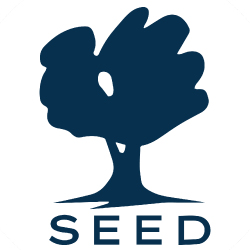Dr. Mirza Dinnayi was awarded the Aurora Prize in October for his work as a Yezidi activist and for rescuing more than 1,5000 victims of terrors and rehabilitating hundreds of women and girls used by ISIS as sex slaves. He spoke with SEED to explain why he chose us as one of the three organizations which will be donated a portion of the $1 million prize.
What were your feelings when you knew you were a finalist and then had won the Aurora Prize?
For me it was a nice feeling. Working in the humanitarian field, working with the victims, you have a lot of stress — due to the work, you sometimes have that feeling that you aren’t making progress, perhaps you haven’t reached goals that you set up for yourself, and for us, especially, you have stress from within the community. So it was like a promotion for me to understand that there are some people who are admiring my work and know I am doing well, so this was symbolic feedback for me.
The Aurora Prize is tied to the Armenian Genocide. Yezidis and other groups in Iraq and Kurdistan have endured numerous genocides. How did it impact you, as a Yezidi, going to Armenia for the prize?
It was very important for me, as a survivor of genocide in the 21st century, to be recognized by the survivors of the Armenian Genocide whose grandfathers were victims just like my generation. It was important for me symbolically to receive this prize.
Can you explain the plight of the Yezidis in the recent past?
The Yezidis are survivors of 72 genocides throughout history. In all the past genocides, no one heard the voice of the Yezidis, no one heard the screaming of the women and children, no one heard the voice of the victims and no one saw or witnessed our suffering. So on one hand we are lucky that in the 73rd genocide in 2014 — committed by ISIS where they killed about 10,000 people and enslaved about 6,500 women and children and displaced 80-90 percent of the Yezidi population particularly from Sinjar (Shingal) and destroyed their areas, shrines and tried to exterminate their identity, that this time our voice was heard.
Not only by my announcement for the Aurora Prize, but also by the announcement of Nadia Murad for the Nobel Prize and also by all the international and national NGOs who are working on behalf of the Yezidis and those countries who recognize the Yezidi Genocide. We know that the plight of the Yezidi people is not finished and the genocide is still ongoing. But at least we have many friends who are hearing our voices and have sympathy with our plight. We are sure that this time won’t be like the previous times.
What inspired you to found the Iraq Air Bridge and what has been its work through the ISIS conflict?
I am a little bit crazy. I cannot be silent when I see mistakes, either on a political or humanitarian level; so therefore, I am not that guy who says, “I don’t care.” I do care about things happening around me — not only the suffering of my own people. If the Yezidi plight was the plight of any other people in the world, I would go and help them as much as I can. That is my own personal approach to the crisis. But 2014 was very specific because my own people were in danger. My people were being kicked out of their own houses, they were starving on the plateau of the mountain and couldn’t be helped.
My NGO had been founded on the grounds of another painful event in 2007, when the Al Qaeda terrorist organization attacked three Yezidi villages and killed 310 Yezidis and injured 850 innocent civilians. At that time I started a humanitarian mission. I brought humanitarian aid from Germany. We held a fundraiser for the Yezidi victims and I brought money for those victims to survive. I saw many children who were severely injured; therefore, I wanted to bring those children to Germany. So I brought those first six children to Germany for medical treatment and after three months and successful treatments, I decided to establish an NGO — a German NGO — the Iraq Air Bridge or Die Luftbrücke Irak.
In 2014, following the situation with the Yezidis, I volunteered with Iraq’s aviation to bring food and water to Mount Sinjar and to save the lives of vulnerable women and children by bringing them from the mount to the safe-zone area in Kurdistan. During that time, I survived a helicopter crash on August 12, 2014. From that point on my life has changed. I work sometimes 18 hours per day — from the morning until midnight often without stopping. I try to bring the voice of the victims with me wherever throughout the world whenever I can. I don’t say I’m fully satisfied, but our community now has a lot of friends and people who support us and show sympathy and solidarity. Together with those friends, I believe, we can reach something.
Why did you decide to donate some of the prize to SEED?
It was an easy decision for me. I have known SEED Foundation and its Co-Founders Sherri Kraham Talabany and Tanya Gilly Khailany for a long time. As SEED started to help the survivors of ISIS, it has had excellent programs helping the survivors of the conflict, those affected by GBV, and particularly with those who have survived the genocide and sex slavery. I saw and admired this work. I believe SEED is the most professional organization in Kurdistan in this field that is the field of GBV victims; therefore, it was very easy for me to decide to choose SEED Foundation as one of the three organizations which I was going to donate the prize to.
